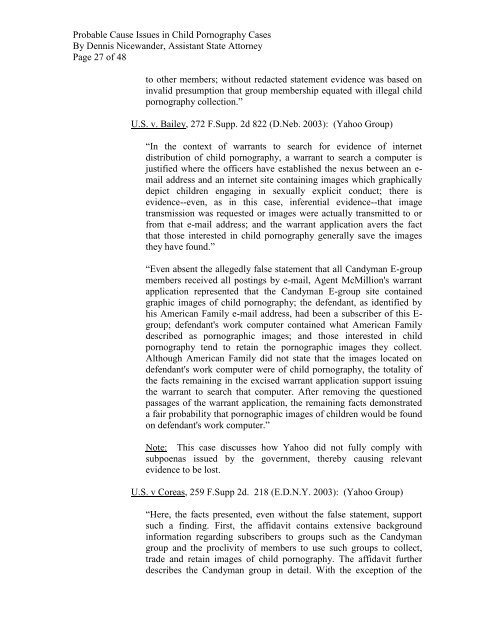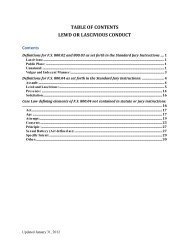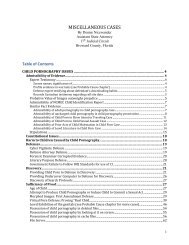Probable Cause Issues in Child Pornography ... - Locatethelaw.org
Probable Cause Issues in Child Pornography ... - Locatethelaw.org
Probable Cause Issues in Child Pornography ... - Locatethelaw.org
You also want an ePaper? Increase the reach of your titles
YUMPU automatically turns print PDFs into web optimized ePapers that Google loves.
<strong>Probable</strong> <strong>Cause</strong> <strong>Issues</strong> <strong>in</strong> <strong>Child</strong> <strong>Pornography</strong> Cases<br />
By Dennis Nicewander, Assistant State Attorney<br />
Page 27 of 48<br />
to other members; without redacted statement evidence was based on<br />
<strong>in</strong>valid presumption that group membership equated with illegal child<br />
pornography collection.”<br />
U.S. v. Bailey, 272 F.Supp. 2d 822 (D.Neb. 2003): (Yahoo Group)<br />
“In the context of warrants to search for evidence of <strong>in</strong>ternet<br />
distribution of child pornography, a warrant to search a computer is<br />
justified where the officers have established the nexus between an email<br />
address and an <strong>in</strong>ternet site conta<strong>in</strong><strong>in</strong>g images which graphically<br />
depict children engag<strong>in</strong>g <strong>in</strong> sexually explicit conduct; there is<br />
evidence--even, as <strong>in</strong> this case, <strong>in</strong>ferential evidence--that image<br />
transmission was requested or images were actually transmitted to or<br />
from that e-mail address; and the warrant application avers the fact<br />
that those <strong>in</strong>terested <strong>in</strong> child pornography generally save the images<br />
they have found.”<br />
“Even absent the allegedly false statement that all Candyman E-group<br />
members received all post<strong>in</strong>gs by e-mail, Agent McMillion's warrant<br />
application represented that the Candyman E-group site conta<strong>in</strong>ed<br />
graphic images of child pornography; the defendant, as identified by<br />
his American Family e-mail address, had been a subscriber of this Egroup;<br />
defendant's work computer conta<strong>in</strong>ed what American Family<br />
described as pornographic images; and those <strong>in</strong>terested <strong>in</strong> child<br />
pornography tend to reta<strong>in</strong> the pornographic images they collect.<br />
Although American Family did not state that the images located on<br />
defendant's work computer were of child pornography, the totality of<br />
the facts rema<strong>in</strong><strong>in</strong>g <strong>in</strong> the excised warrant application support issu<strong>in</strong>g<br />
the warrant to search that computer. After remov<strong>in</strong>g the questioned<br />
passages of the warrant application, the rema<strong>in</strong><strong>in</strong>g facts demonstrated<br />
a fair probability that pornographic images of children would be found<br />
on defendant's work computer.”<br />
Note: This case discusses how Yahoo did not fully comply with<br />
subpoenas issued by the government, thereby caus<strong>in</strong>g relevant<br />
evidence to be lost.<br />
U.S. v Coreas, 259 F.Supp 2d. 218 (E.D.N.Y. 2003): (Yahoo Group)<br />
“Here, the facts presented, even without the false statement, support<br />
such a f<strong>in</strong>d<strong>in</strong>g. First, the affidavit conta<strong>in</strong>s extensive background<br />
<strong>in</strong>formation regard<strong>in</strong>g subscribers to groups such as the Candyman<br />
group and the proclivity of members to use such groups to collect,<br />
trade and reta<strong>in</strong> images of child pornography. The affidavit further<br />
describes the Candyman group <strong>in</strong> detail. With the exception of the





